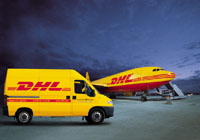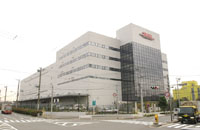Is Japan Recovering?
Back to Contents of Issue: October 2003
|
|
|
|
by John Dodd |
|
 THE TURNAROUND OF DHL Japan's business over the last four years is an impressive one. A decision made to make a $150 million investment in the Japan market has paid off handsomely for the company, and it now enjoys the position of being the top logistics company in the country. At the helm of the company for the last 12 months is Scott Price, a 42-year old US native. Price himself has a unique background, with dual Masters in Business Administration (MBA) and in Asian Studies from the University of Virginia, and 13 years with the Coca Cola Company at all levels of the company in Japan and Asia, which have made him fluent in Japanese. We talk to Price about the hidden story of Japan's apparent economic recovery, as told from its growth patterns, and about the recovery of the DHL Japan business as well. THE TURNAROUND OF DHL Japan's business over the last four years is an impressive one. A decision made to make a $150 million investment in the Japan market has paid off handsomely for the company, and it now enjoys the position of being the top logistics company in the country. At the helm of the company for the last 12 months is Scott Price, a 42-year old US native. Price himself has a unique background, with dual Masters in Business Administration (MBA) and in Asian Studies from the University of Virginia, and 13 years with the Coca Cola Company at all levels of the company in Japan and Asia, which have made him fluent in Japanese. We talk to Price about the hidden story of Japan's apparent economic recovery, as told from its growth patterns, and about the recovery of the DHL Japan business as well.
With your background, you could be regarded as a Japan expert. What's your prognosis on the state of the Japanese economy?
Japan in general over the last two decades has suffered from 'an overestimation of the facts.' By that I mean that initially you had a situation where people overestimated Japan's economic potential back in the late 80s, and now you have them underestimating the potential for economic recovery. While it is true that there has been deflation, a large drop in the stock market and depreciation of land values, the GDP has still grown, this is still the second largest economy in the world and there is massive infrastructural change going on.
So you think there is hope?
The amount of change going on right now in some specific industries is really quite amazing. We're in a position to see and enjoy this change because our industry, the logistics industry, is a facilitator of these changes -- and I can tell you that we're having great financial results from all the new business.
What kind of results?
Double digit growth last year, and similar growth for this year and next. I often hear comments that no one in our industry can achieve growth of more than 1 percent a year. Well this is clearly not true. We foresaw the China trend, and we're at the nexus of the transport boom resulting because of it. China really is becoming the factory floor for Japan. It's not just massive car companies moving their 2000-person factories, but as well we're seeing lots of medium- and small-sized companies sourcing materials and finished goods out of China.
What role does your company and your industry have to play in China's boom?
The air express industry is responsible for moving the products and components between countries in a cost-effective way. Although conventionally people have equated express airfreight with expense and not saving money, recently companies are getting smarter and realizing that for some products, the cost of capital tied up in shipping by boat and the cost of documentation actually exceeds the costs of shipping to market quickly. This is particularly true for high-value finished goods and components -- such as electronic components: chips, hard disk drive parts, et cetera.
But there is a limit to how many electronic parts are being shipped.
Yes, so we are also shepherding in a whole new market -- assisting smaller companies doing business with China. We help them make the shipping process more transparent and safer. The embodiment of this trend is our IMP service for China, which is a package of trade facilitation services targeted at small-to-medium size Japanese importers. Many of these smaller companies don't speak the language [Chinese] and don't have the right financing know-how [LCs, etc.], and so in many cases they are forced to use a trading house or other middleman. What IMP lets them do is to find products over the Internet, then use our service to get that product into Japan with a lot less effort and risk on their part. We take a lot of the uncertainty of dealing with China out of the equation. What the customer sees is invoicing, tracking, and delivery information all in Japanese. Everything is secure and accountable.
Right, so thanks to the Deutsche Post WorldNet logistics IT system, we now have the power to not only offer shipping capability from 500 grams to 500 tons, but to also offer a host of add-on services, such as tracking, delivery speed versus price [e.g., overnight versus two weeks], warehousing, breakdown of single loads into multiple deliveries, et cetera. All of this gives the smaller shipper confidence that doing business with China is doable and safe, and thus Japan is becoming more of an inbound air transport market rather just an outbound one.
Are your traditional shippers are also experiencing an upturn in business? Semiconductor companies, for example.
Well, as you know, the chip industry has been in the doldrums for some time now. That said, though, we are indeed experiencing an increased demand for freight. I'd put this increase down partly to recovering consumer demand for products, but also because other industries such as auto manufacturing are starting to use a lot more semiconductors. There is a general trend to start building intelligence into products.
OK, so let's look at the types of companies doing business out of China. Just how small can they be -- are we seeing Mom and Pop operations getting in on the act?
We segment our clients based upon frequency of interaction with us. What has surprised me the most is the amount of business we are doing through IMP with customers who interact with us just two or three times a month. These are indeed small companies.
And these small companies are finding products on the Internet and placing orders?
Absolutely.
How do they know what they're buying is what they'll get?
In true Japanese fashion, they use kuchikomi -- talking to the neighbors -- to find out which sites and which suppliers are reliable. Also, the Chinese are putting a lot more information on their Web sites in Japanese -- so you can tell to a certain extent how professional sellers are based on the quality of their sites and the quality of their reputation. The tools for making a good choice are there. Then, once they make a decision to buy, our service kicks in to ensure safe delivery of the products to Japan.
Where in China is most of the freight coming from?
The Pearl River Delta. Historically Hong Kong has been the outlet for trade with China, so a lot of Japanese banks and companies still have operations there. It was the jumping off point. Then, as China opened up, people started to venture further inland. But fundamentally the Japanese have been comfortable doing business in that area and continue to do so today. For instance, our largest shipments come from cities such as Guangzhou, Shanghai, Pudong and Shenzhen.
One nagging question about doing business in China is: "How safe is your money?"
There is a new confidence in Japanese companies dealing with China. Things are definitely changing, and there is an emergence of a legal system that protects investments in China. After all, if you look at how many billions of dollars are being invested in China, it is clear that the Chinese government has reason to ensure people retain confidence in dealing with the country. But although things are safer now, there is still that fear of the unknown by people new to dealing with China, and thus we make a good partner in smoothing out that process, with the largest network in the industry for China.
Then, about four years ago, there was a recognition of the fact that Japan is the world's second largest economy and there was no way that we could become a major player unless we built our own footprint and our own infrastructure -- so that we could be in charge of our own destiny. We have since invested over $250 million here in Japan and have built 23 new service centers (currently 26 in total) and DHL's largest Asia distribution center, the Tokyo Distribution Center, located in Shinkiba. It's a model of how distribution centers are supposed to work.
How big is big?
The Shinkiba facility is over 18,000 square meters in size, and has 450 employees.
In Narita, as of August 23, we opened our new on-airport location -- at Terminal One, which we developed with Northwest Airlines. This facility will help us round out our ability to control all aspects of the freight process. I would say that we will probably now have control of over 95 percent of the entire process -- significantly more control than many of our competitors.
What's the other 5 percent?
Even with 27 distribution centers, there are some remote locations that we still ask a local freight company to handle for us. But the point to remember is that in just four years we've gone from someone else managing 95 percent of our business to us managing that 95 percent. Coupled with our IT systems, this investment has pushed us easily into the number one spot for airfreight handling in Japan.
Did all the money go into infrastructure?
No. Because we are a service company, people are our greatest asset. So we've invested in creating an environment that makes people want to work for us, particularly bilinguals. We've invested in a major office refurbishment, we've invested in recruiting and in training -- all to establish the fact that we're unique and multinational, and that there is a future here. By making these investments, I hope to grow our business from simply being No.1 in Japan by a few percentage points into clear leadership in the market.
Why aren't there any major Japanese international express players? After all, there are some big domestic companies.
Well, Japan is unique in the world of freight and transport. You have a density of population and reliance on public transportation, which has led to the development of the largest domestic express business in the world. The size of the domestic market is mind boggling: It is larger than the entire express freight business for Europe. This really blows people's minds when I tell them.
Therefore, if I was a local transport company who got into the business at the beginning of the industry boom, I'd stay focused on what I know best, for as long as the boom continues.
So, there has been such a huge expansion of the domestic business, investment naturally focused on this, and the international side never really developed. Building an international network takes a lot of capital, and nowadays there is a high barrier to entry. DHL for example is in 220 countries and has 17,000 employees -- it took a lot of investment to create that.
So does this mean that DHL and the Japanese companies will stick to their knitting, with you doing international and them doing domestic?
OK, so getting back to how the company was able to turn around. How has the investment paid off?
What it's done is give us "presence" in the market. A DHL salesman in Kyushu is going to do a far better job of selling DHL services and products than an agent is. Just having this level of presence, something which has happened in just the last three years, has made a huge difference to the amount of business we can do.
So your salespeople are literally going out and knocking on doors to sell?
Yes. We have a direct sales force of over 200 people nationwide. We also do a lot of marketing, and for smaller customers who use us once or twice a month, we have the Internet and a toll-free call center for them to contact. Actually, for security reasons, we have two call centers: one here in Tokyo and one in Osaka.
You have a marketing background. What marketing steps did you take to build public awareness of DHL as you were making the infrastructure investments?
What are the major contributing factors to DHL Japan becoming No. 1 in the Japanese market?
A big footprint, strong awareness, great service and good pricing. Having the largest number of service centers to sell, pick up, and deliver goods is definitely a key contributor. So the business decision made four years ago to make a major investment in Japan was obviously a very strategic one, which has really paid off for us. In making the investment, we were able not only to capture an incremental share of the existing market, but to create a new market as well. With IMP, we have helped smaller companies realize that they too can import from China and thus we grew the pie.
To paraphrase Adam Smith, is IMP helping Japan to become a "nation of shopkeepers?"
No. Japan has tremendous human resources that will ensure that the country continues to be a player in the global economy. The high education level, the work ethic ... this isn't a nation which is going to be overcome by its smaller neighbors because of some creeping proclivity to not want to work hard. These predictions of economic decay are overblown. There will be a balancing out of current trends, and things will improve again. Japan is not a closed system, neither is it a helpless one. As problems appear, the people of the nation will figure out a way to solve them. @
|
|
Note: The function "email this page" is currently not supported for this page.


 Given that your IMP service is hitting a lot more smaller companies, you must have a wide variety of shipping requests.
Given that your IMP service is hitting a lot more smaller companies, you must have a wide variety of shipping requests.
 I can't claim all the credit for the turnaround. I am continuing in a role that was first created by my predecessors. Started in the 70s, DHL Japan was just a small group of agents and Japanese delivery partners who would go to Narita in beat-up old cars, pick up a package and deliver it to some bank in Marunouchi. Cost-cutting was the only real differentiator in what was an unsophisticated industry. There was no sense of the big picture and so it was run like a cottage industry.
I can't claim all the credit for the turnaround. I am continuing in a role that was first created by my predecessors. Started in the 70s, DHL Japan was just a small group of agents and Japanese delivery partners who would go to Narita in beat-up old cars, pick up a package and deliver it to some bank in Marunouchi. Cost-cutting was the only real differentiator in what was an unsophisticated industry. There was no sense of the big picture and so it was run like a cottage industry.
 But it is instructive to remember that just as we had modest beginnings here in Japan, so did the local companies. This may be urban legend, but there is the story of the first domestic express business in Japan being the shipping of packages on the Shinkansen in the late 60s. As the story goes, someone in Tokyo would buy a cheap platform ticket, leave the package on a particular seat on the Shinkansen, then call up his counterpart in Osaka, who would also buy a platform ticket, and go meet the train and pick up the parcel. Not particularly secure, but very cost-effective!
But it is instructive to remember that just as we had modest beginnings here in Japan, so did the local companies. This may be urban legend, but there is the story of the first domestic express business in Japan being the shipping of packages on the Shinkansen in the late 60s. As the story goes, someone in Tokyo would buy a cheap platform ticket, leave the package on a particular seat on the Shinkansen, then call up his counterpart in Osaka, who would also buy a platform ticket, and go meet the train and pick up the parcel. Not particularly secure, but very cost-effective!



